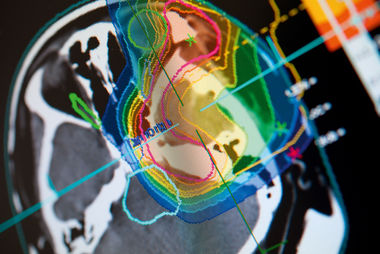Radiation Therapy at Heidelberg University Hospital - Shorter radiation duration, equivalent treatment result

A treatment study led by Heidelberg University Hospital shows that more intensive, but shorter radiation therapy after breast cancer surgery is just as effective as standard therapy / Results have been published in the International Journal of Radiation Oncology - Biology - Physics
After breast cancer surgery, the immediate vicinity of the removed tumour is usually irradiated separately and intensively in addition to irradiation of the entire breast. However, this "boost" radiation does not necessarily have to take place right after the several weeks of radiation, as has been recommended up to now. It is just as effective if it is integrated simultaneously into a modern radiation concept, as a study published in the International Journal of Radiation Oncolocy - Biology - Physics under the direction of the Radiological University Hospital Heidelberg has shown. The integrated boost radiation shortens the radiation therapy by about 10 days to five weeks. During the follow-up period of five years, the new radiation concept was equivalent to the standard treatment in terms of treatment and cosmetic outcome. " The shorter irradiation time is a significant relief for the patients and thus advantageous in terms of quality of life," says first author private lecturer Dr Juliane Hörner-Rieber, Managing Senior Physician of the Department of Radiation Oncology and Radiotherapy at Heidelberg University Hospital.
About the Study
The study, funded by the Federal Ministry of Education and Research, is a cooperation between the Heidelberg University Hospital and Tübingen University Hospital. Between 2011 and 2015, a total of 502 breast cancer patients after breast-conserving surgery and at increased risk of tumour recurrence were included in the study at both sites. Allocation to the two treatment groups was randomised.
The current guidelines of the American Society for Radiation Oncology (ASTRO) on radiotherapy for breast cancer still recommend subsequent boost radiotherapy. "This is because there have not yet been any robust data to evaluate integrated boost," says Professor Dr Dr Jürgen Debus, Medical Director of the Department of Radiology at the University and lead author of the study. "Our results are a first important step towards an evidence-based update of the guidelines." In particular, modern radiation techniques such as so-called intensity-modulated radiotherapy (IMRT), in which organs at risk can be spared as much as possible, have paved the way for the new development. The extent to which the results can be transferred to the shortened radiotherapy of the breast, which has been increasingly used for about three years, is the subject of current studies.
Future Study
In the COSMOPOLITAN study led by Heidelberg, a further, drastic shortening of the radiation time is being investigated: In this study, patients with low-risk tumours receive radiotherapy immediately during surgery as a single intraoperative irradiation of the tumour bed. The study will run until 2023, and the first results are expected in 2024.
Radiation oncology at Heidelberg University Hospital
Radiation oncology is one of the three main pillars in oncology together with surgery and systemic treatment such as chemotherapy which take place at the Department of Radiation Oncology at Heidelberg University Hospital.

